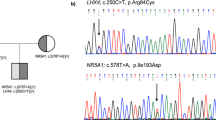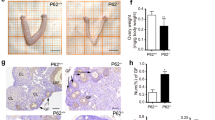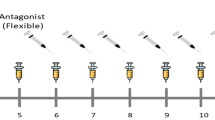Abstract
The frequency of variant LHβ containing two point mutations (T986–C and T1008–C) and its relationship to reproductive disorders differ widely between ethnic groups. In a Japanese population, variant luteinizing hormone (LH) correlates with ovulatory disorders. Here we examined the relationship between two missense mutations and five silent mutations (C894–T, G1018–C, C1036–A, C1098-T and C1423–T) in the LHβ gene, and ovulatory disorders. We studied 43 patients with ovulatory disorders, 79 patients with normal ovulatory cycles, and 23 healthy men who agreed to join our DNA analysis. PCR-amplified LHβ-subunit gene sequences were compared with a base sequence of wild-type LH reported after direct sequencing. The highest frequency (0.945) of novel allele was observed at the position of the C1036–A transition. No homozygotes for wild-type LHβ (C1036) were identified. The frequency of novel allele in patients with polycystic ovary syndrome, endometriosis, premature ovarian failure and luteal insufficiency was significantly different from that of healthy women. The frequencies of novel alleles (C894–T, C1098–T and C1423–T) in patients with ovulatory disorders were significantly higher than those with normal ovulatory cycles. The mean incidence of point mutation in patients with ovulatory disorders was higher than in those with normal ovulatory cycles. Among patients with variant LH, five silent mutations were identified in 87.5% of patients with ovulatory disorders, whereas only a few silent mutations were identified in patients with normal ovulatory cycles. In a Japanese population, five silent mutations of variant LH could have influenced two missense mutations and/or other unknown missense mutations, causing ovulatory disorders.
Similar content being viewed by others
Log in or create a free account to read this content
Gain free access to this article, as well as selected content from this journal and more on nature.com
or
References
Talmadge K, Vamvakopoulos NC, Fiddes JC : Evolution of the genes for the beta subunits of human chorionic gonadotropin and luteinizing hormone. Nature 1984; 307: 37–40.
Hollenberg AN, Postoll RG, Albancse C, Boers ME, Jameson JL : Multiple promoter elements in the human chorionic gonadotropin beta subunit genes distinguish their expression from the luteinizing hormone beta gene. Mol Cell Endocrinol 1994; 106: 111–119.
Weiss J, Axelrod L, Whitcomb RW, Harris PE, Crowley WF, Jameson JL : Hypogonadism caused by a single amino acid substitution in the β subunit of luteinizing hormone. N Engl J Med 1992; 326: 179–183.
Roy Ac, Liao WX, Chen Y, Arulkumaran S, Ratnam SS : Identification of seven novel mutations in LHβ-subunit genes by SSCP. Mol Cell Biochem 1996; 165: 151–153.
Pettersson K, Makela MM, Dahlen P, Lamminen T, Huoponen K, Huhtaniemi I : Gene polymorphism found in the LH beta gene of an immunologically anomalous variant of human luteinizing hormone. Eur J Endocrinol 1994; 130 (Suppl. 2): S17.03 (abstract).
Furui K, Suganuma N, Tsukahara S et al: Identification of two point mutation in the gene coding luteinizing hormone (LH) β-subunit, associated with immunologically anomalous LH variant. J Clin Endocrinol Metab 1994; 78: 107–113.
Huhtaniemi I, Jiang M, Nilsson C, Pettersson K : Mutations and polymorphisms in gonadotropin genes. Mol Cell Endocrinol 1999; 151: 89–94.
Suganuma N, Furui K, Furuhashi M, Asada Y, Kikkawa F, Tomoda Y : Screening of the mutations in luteinizing hormone β-subunit in patients with menstrual disorders. Fertil Steril 1995; 63: 989–995.
Takahashi K, Kurioka H, Ozaki T et al: Increased prevalence of luteinizing hormone β-subunit variant in Japanese infertility patients. Hum Reprod 1988; 13: 3338–3344.
Takahashi K, Ozaki T, Okada M, Kurioka H, Kanasaki H, Miyazaki K : Increased prevalence of Luteinizing hormone β-subunit variant in patients with premature ovarian failure. Fertil Steril 1999; 71: 96–101.
Takahashi K, Eda Y, Abu-Musa A, Okada S, Yoshino K, Kitao M : Transvaginal ultrasound imaging, histopathology and endocrinopathy in patients with polycystic ovarian syndrome. Hum Reprod 1994; 9: 1231–1236.
Okuda K, Yamada T, Imoto H, Komatsubara H, Sugimoto O : Antigenic alterations of an anomalous human luteinizing hormone caused by two chorionic gonadotropin-type amino acid substitutions. Biochem Biophys Res Commun 1994; 200: 584–590.
Huhtaniemi IT : Polymorphism of gonadotropin action: clinical implications. Asian J Androl 2000; 2: 241–246.
Suganuma N, Furu K, Kikkawa F, Tomada Y, Furuhashi M : Effect of the mutations (Trp8→Arg and Ile15→Thr) in human luteinizing hormone (LH) β-subunit on LH bioactivity in vitro and in vivo. Endocrinology 1996; 137: 831–838.
Haavisto AM, Pettersson K, Bergendahl M, Virkamaki A, Huhtaniemi I : Occurrence and biological properties of a common genetic variant of luteinizing hormone. J Clin Endocrinol Metab 1995; 80: 1257–1263.
Jiang M, Pakarinen P, Zhang FP et al: A common polymorphic allele of the human luteinizing hormone beta-subunit gene: additional mutations and differential function of the promoter sequence. Hum Mol Genet 1999; 8: 2037–2046.
Lamminen T, Huhtaniemi I : A common genetic variant of luteinizing hormone; relation to normal and aberrant pituitary-gonadal function. Eur J Pharmacol 2001; 414: 1–7.
Okuno A, Komori S, Sakata K et al: Genetic analysis of a variant luteinizing hormone in an infertile woman. Arch Gynecol Obstet 2001; 265: 148–150.
Nilsson C, Pettersson K, Millar RP et al: World frequency of a common genetic variant of luteinizing hormone: an international collaborative research. Fertil Steril 1997; 67: 998–1004.
Author information
Authors and Affiliations
Corresponding author
Rights and permissions
About this article
Cite this article
Takahashi, K., Karino, K., Kanasaki, H. et al. Influence of missense mutation and silent mutation of LHβ-subunit gene in Japanese patients with ovulatory disorders. Eur J Hum Genet 11, 402–408 (2003). https://doi.org/10.1038/sj.ejhg.5200968
Received:
Revised:
Accepted:
Published:
Issue date:
DOI: https://doi.org/10.1038/sj.ejhg.5200968
Keywords
This article is cited by
-
A brief insight into the etiology, genetics, and immunology of polycystic ovarian syndrome (PCOS)
Journal of Assisted Reproduction and Genetics (2022)



